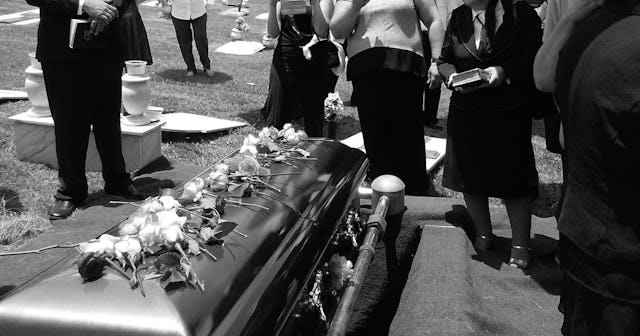Why I'm Going To The Funeral Of My Estranged Grandma

Tomorrow I have to attend the funeral of the woman who was genetically and legally my grandmother; she was the mother of the man who is genetically and legally my father. But she wasn’t really my grandmother. She never baked me cookies or read me stories. She never attended volleyball games or came to watch me in school plays. She didn’t attend my high school graduation and she didn’t attend my wedding. She didn’t visit me or my girls after their births and she only met my three older girls once when I attended my aunt’s, her daughter’s, funeral four years ago (and even then, I didn’t tell them who she was to me). I don’t have fond memories of her. In fact, most of the ones I have from my childhood involve her being drunk and mean.
RELATED: What To Do When Your Grown Child Ignores You (And Breaks Your Heart)
Once my mom met my stepdad and we moved to a new town, I had no contact with this woman until I was 18. For over ten years, there weren’t any birthday cards or phone calls, definitely no in-person visits. She only lived 30 minutes away, but I didn’t see her again until the man who is genetically and legally my father wanted to reconnect with me when I was 18.
I allowed their family back into my life, and the bliss was short-lived. Who would’ve thought that people who wanted nothing to do with me for over ten years hadn’t suddenly turned over new leaves and decided I was worth the effort? Well, me, apparently. Because the next few years were filled with me making the effort to mend the tattered relationships that weren’t my responsibility to mend in the first place. There were lots of unkind words said between me and the woman who was genetically and legally my grandmother. Then, no contact again.
Once my first child came along, I stopped trying to force the relationship with the man who is genetically and legally my father and the rest of his family. It took becoming a parent myself to realize that there was absolutely nothing in this world that could keep me away from my children and that most normal, healthy adults felt the same way.
When my aunt died four years ago, I went to the funeral. I visited the family beforehand, and the woman who was genetically and legally my grandmother was much older and clearly deteriorating physically and mentally. She was very sweet to me that day and was so happy that I allowed her to meet my children, who were genetically and legally her great-grandchildren. I’m grateful that I had those few hours with her. The woman I saw that day was sober, kind, and obviously didn’t remember the last conversation we had in which terrible words were said by both of us. For that reason, that one conversation alone, I’m attending her funeral tomorrow.
I am the oldest of my cousins on that side, and I didn’t get the chance to grow up with the sober version of our grandmother. So most of the images I have when I think of her are not nice ones. I’ll sit through the funeral and hear stories about what a wonderful person she was, and I won’t necessarily agree. But I’ll sit quietly, ostracized from the rest of them, and remember that one nice conversation I had with her four years ago.
When parents walk out of their children’s lives and families of that parent don’t make the effort to keep up the relationship, it’s ultimately the kids that suffer. They may grow up to be happy, healthy people with successful lives, but there will always be a little voice in the back of their head reminding them that someone, or some people, didn’t find them worthy. Every milestone in their life will be filled with mixed emotions and an empty space that they won’t quite know how to fill. This is made worse when that parent or their families float in and out of the child’s life leaving empty promises behind each time.
I hate that I’m 30 and these people still have such a hold on me. I have a great husband, mother, siblings, and one amazing stepdad and grandma who have loved me like their own even though I’m not genetically or legally theirs. I am also blessed to have four beautiful daughters to call mine who will never have to endure the hurt of a parent walking out of their lives.
Blood doesn’t make family, it’s as simple as that — but it does make a sense of obligation to someone who is genetically and legally yours.
This article was originally published on